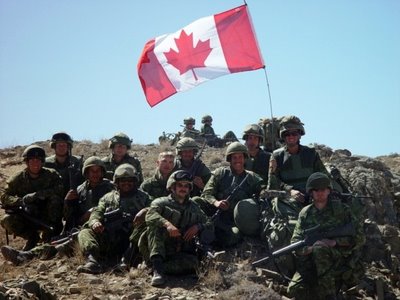
From Peter Jones, the Ottowa Citizen: From the first Gulf War, to Bosnia and Kosovo, to Afghanistan and now to Libya, Canada has carried much more than its share of NATO’s burdens. Though the size of our military remains small compared to those of many of our allies, the critical difference is that Canada has routinely demonstrated, under both Liberal and Conservative governments, that it is prepared to send them into harm’s way and to equip them to be able to deploy around the world and work with the allies.
This places us in a very small group within the alliance. In his final major speech as U.S. defence secretary, Robert Gates warned pointedly that a “two-tiered” alliance is emerging, composed of a few countries which are able and willing to fight and many others who cannot or will not. . . .
Now, most recently in Libya, Canada again performed 10 per cent of all of the sorties undertaken by NATO, a much higher percentage than the number of jets we committed to the overall effort would have suggested. More importantly, Canada was, yet again, one of a very few countries that allowed its jets to take part in the riskiest missions and actually drop bombs, the so-called “strike missions.” Most countries which sent aircraft to the mission only allowed them to patrol the skies to enforce the “no-fly zone” over Libya — sounds nice, but there was no Libyan air force and hence no one to violate the zone. In effect, most of the jets which took part in the effort had orders from their country to fly around, but not actually fight.
The debate over burden-sharing has thus been turned on its head. Numbers still matter, of course, but the static budgetary and counting exercises of the Cold War count for much less when what matters most is whether you are prepared to fight for something other than your own immediate defence. In retrospect, it seems clear that many Europeans’ commitment to collective defence during the standoff with the Soviets wasn’t much more than a commitment to their own defence. In a post-Cold War era, when the burdens of NATO membership entail sending one’s troops to actually fight in faraway places, most European governments are decidedly less interested.
So who’s a “free rider” now? And how long, in an era of prolonged economic austerity, will Canada and the few other allies who actually contribute to the fighting be prepared to accept these costs when so many others are not?
Peter Jones is an associate professor in the Graduate School of Public and International Affairs at the University of Ottawa. (photo: Surghar Daily) (via @blencowe)
Image: surgarnet%2010%2025%2011%20Canadian%20forces%20in%20Afghanistan.jpg
